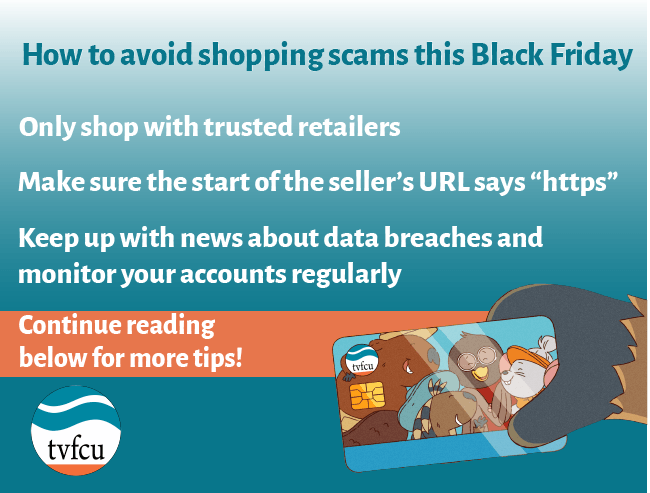Beware of shopping scams this Black Friday
November 19, 2024

Common Ways Fraudsters Target Online Shoppers
Shopping online is super convenient—you can quickly find what you need, compare prices, and avoid long store lines, which is especially nice during the busy holiday season. But it’s important to shop carefully because sometimes items may not arrive, could be damaged, look different than advertised, or even turn out to be fake, some sellers might also tack on hidden fees. Even worse, if you accidentally share your personal and financial information with a scam website, you could risk identity theft and serious financial loss.
According to the Cybersecurity and Infrastructure Security Agency (CISA), scammers take advantage of online shoppers in three main ways:
- Creating Fake Shopping Sites and Email Messages
You receive an email promising great deals on brand-name or hard-to-find items in honor of Black Friday. You’re looking for a specific gift and can only find it in an online store you’ve never heard of before. While these could be real, there’s a chance you’ve encountered a fraud site or email message created to get visitors to provide sensitive personal and financial information. That could mean you’re paying for an item you’ll never receive – or even setting yourself up for identity theft and financial fraud. The emails and sites can be easy to differentiate from a real one, or they can look exactly identical. It just depends on the scammer’s level of expertise, which is why you need to be vigilant even if you think it looks real.
- Gathering Information from Non-Secure Transactions
Encryption is essential for online shopping. This cybersecurity measure scrambles plain text so it can be read only by a user with a special code. If a legit seller or store does not use encryption, a cybercriminal could intercept your personal or financial information as it’s transmitted. Look for “https” at the start of a site’s address. If you don’t see the “s” and only see “http,” the site is not encrypted.
- Targeting Your Device’s Vulnerabilities
Without antivirus and anti-malware protections, cybercriminals may be able to access your computer, tablet, or smartphone and all the sensitive information stored on it. Stores and sellers should protect their computers to prevent these fraudsters from accessing their customer databases.
How Can You Protect Yourself?
While some risk is always associated with online shopping, you can use these simple strategies to keep yourself safe:
- Shop with online retailers you already know and trust.
- Beware of marketplace sellers or new stores that contact you directly via email.
- Make sure you see the “https” at the start of a store or seller’s URL.
- If using an app to shop, make sure it’s the official one associated with the store (Amazon, Target, etc.).
- Keep up with news about data breaches and monitor your accounts regularly.
- Secure your devices with antivirus and anti-malware software.
- Avoid conducting sensitive transactions on public networks.
- Think twice before storing your credit card details on your device or with a merchant.
- Create strong passwords to protect your accounts.
- Consider identity theft protection.
Related Links:
TVFCU Perks Checking Accounts include ID Theft Protection https://www.tvfcu.com/personal/personal-checking/compare-accounts.html
Cybersecurity & Infrastructure Security Agency https://www.cisa.gov/
Contact TVFCU for any questions https://www.tvfcu.com/about-us/contact-us.html
